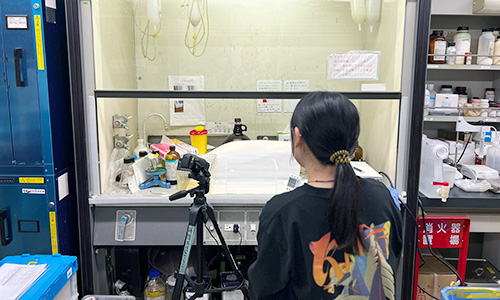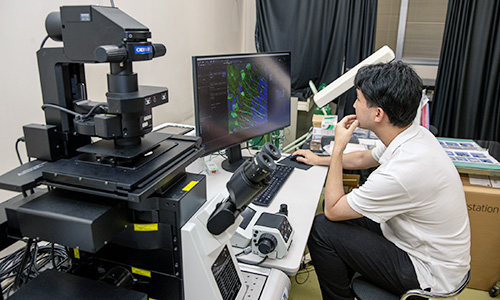Please tell us about the guidance policy for graduate students.
 Our laboratory aims to develop "first-class researchers who can compete in the world".
Our laboratory aims to develop "first-class researchers who can compete in the world".
In other words, in the future, we aim to develop human resources who will not only be able to make a living by working as scientists, researchers, and scientists, but also to disseminate the research results to the world. Therefore, it is basically intended for those who are willing to proceed to the doctoral course.
However, if you are willing to do proper research, those who graduate from the master's degree and get a job are also welcome.
In order to acquire the necessary abilities as a researcher, each researcher is in charge of one independent research theme in our laboratory.
Then, the person himself / herself is responsible for completing the process of formulating a research plan, carrying out the experiment, interpreting the experimental results and fine-tuning the research plan, presenting at the conference, writing the dissertation, and accepting it. To this end, we have a close cooperation system in the laboratory, and we have a system in which experienced researchers give careful guidance.
By experiencing these processes with close guidance, you should be able to acquire the necessary qualities as a researcher who can compete in the world by the time you graduate from graduate school (when you obtain a degree). In fact, the graduate students that Hoshino has supervised so far have achieved the following results.
Of the seven people who have obtained a degree, two are already PRESTO researchers.
N.M. Doctoral course at Kyoto University (graduated in 2002, Gakushin DC1) Current position, Kyoto University Hakubi Project, Leader (PI), PRESTO Researcher, Achievements at the time of enrollment, JBC (2002) MCN (2003), etc.
MY Graduated from Kyoto University doctoral course (2005 graduate) Incumbent / Meyrland Univ. While studying abroad (overseas studies) Achievements at the time of enrollment / Meck.Dev (2002), JNS (2005), GEP (2003), Nat Cell Biol. (2005) , Co-authored)
T.K. Graduated from the doctoral course at Kyoto University (graduated in 2004), current researcher at PRESTO University, lecturer at Keio University, researcher at PRESTO, achievements at the time of enrollment / EMBO J (2003), Nat Cell Biol (2006), Neuron (2010), etc.
S.N. Graduated from Kyoto University doctoral course (2005 graduate, Gakushin DC1) Current position / RIKEN CDB, postdoctoral researcher, achievements at the time of enrollment / Neuron (2005)
Y.N. Graduated from Kyoto University doctoral course (graduated in 2010) Current position / Doshisha University, Assistant Professor, Graduate School of Brain Science, Achievements at the time of enrollment / JBC (2009), etc.
MY Graduated from Kyoto University doctoral course (2010 graduate, Gakushin DC2) Current position / Postdoctoral fellow at National Center of Neurology and Psychiatry (Gakushin PD) / JNS (2007), Development (2009, co-authored), Sicence Signaling (2010) , Co-authored) Others
T.F. Graduated from Kyoto University doctoral course (2012 graduate, Gakushin DC1) Currently, postdoctoral fellow at the National Center of Neurology and Psychiatry, dissertation at the time of enrollment, Development (2009), JNS (2009 co-authored), etc.
Can each research theme really compete with the world's research speed?
 Yes, I believe it's okay for the reasons described below. The Indeed, in the face of fierce international competition in research, it is the one who continues to deliver truly valuable and world-leading achievements.
Yes, I believe it's okay for the reasons described below. The Indeed, in the face of fierce international competition in research, it is the one who continues to deliver truly valuable and world-leading achievements.
It's not always easy. Therefore, the phenomenon that multiple researchers (including graduate students) research on one theme and publish one paper is becoming more common in domestic and overseas laboratories.
I think there are some unavoidable parts in winning the fierce competition, but this makes it difficult to acquire the experimental planning, execution, and dissertation writing skills that graduate students should acquire. Therefore, in principle, we do not have such a system.
Therefore, in order to compete with the rest of the world even with a research theme system for each person, we are enthusiastic about creating a system that allows one experimenter to carry out as many experiments as possible efficiently. At university, students tend to spend a lot of time doing experiments because they have to do various chores (cleaning and management of laboratory equipment, etc.). In our laboratory, technicians provide such support, so you can concentrate on your experiments.
In addition, since it is a national research institute, we have abundant equipment, etc., so by using various equipment, it is possible to automate and streamline the work of experiments, and even one researcher can proceed with experiments efficiently and quickly. We are here.
For example, if you use an automatic DNA separator, the machine will separate the plasmid DNA while you sleep at home after the experiment.
You can start experimenting with that DNA the next morning. In fact, most of our past achievements are research done on a one-by-one theme.
In addition, each researcher has one theme, but since they cooperate with each other's research in their own fields of expertise, they can publish many co-authored papers.




 Our laboratory aims to develop "first-class researchers who can compete in the world".
Our laboratory aims to develop "first-class researchers who can compete in the world".